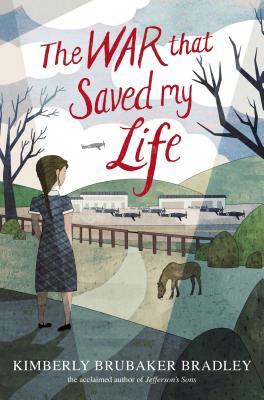This is a bit of a cheat, since in truth I read The War That Saved My Life while I was on vacation in France last week. But wifi was hard to come by, so the review is coming a bit belatedly.
I’ve been hearing such great buzz about this book, and I have to say, it’s very well-deserved. I was sucked into this story immediately by our engaging narrator, nine-year-old Ada, whose worldview has been so limited prior to the story’s beginning. Because of her clubfoot (and her  mother’s emotionally abusive nature), Ada has never stepped outside their London apartment. But everything changes with World War II, as along with many other London children, Ada is shipped to the countryside, along with her younger brother Jamie. Taken in by Susan, a stern, aloof woman with wounds of her own, Ada finds her world opening up in ways both startling and profound. She connects with Susan’s pony, other children, and eventually with Susan herself. At the same time, though, Ada struggles to believe in the possibility of a real connection with Susan. Her whole life experience has kept love an arm’s length away, and to some degree, she’s waiting for her experience in the countryside to disappear like the mirage she expects it to be. It’s expectations like that which feed a reader’s connection to Ada. The mixture of her hope and fear of disappointment is powerful, and a big contributor to the story’s pacing as, like Ada, we read in fear of the other shoe dropping.
mother’s emotionally abusive nature), Ada has never stepped outside their London apartment. But everything changes with World War II, as along with many other London children, Ada is shipped to the countryside, along with her younger brother Jamie. Taken in by Susan, a stern, aloof woman with wounds of her own, Ada finds her world opening up in ways both startling and profound. She connects with Susan’s pony, other children, and eventually with Susan herself. At the same time, though, Ada struggles to believe in the possibility of a real connection with Susan. Her whole life experience has kept love an arm’s length away, and to some degree, she’s waiting for her experience in the countryside to disappear like the mirage she expects it to be. It’s expectations like that which feed a reader’s connection to Ada. The mixture of her hope and fear of disappointment is powerful, and a big contributor to the story’s pacing as, like Ada, we read in fear of the other shoe dropping.
Reading Ada’s story while traipsing around wet, soggy France and visiting the Maginot Line tunnels, it was hard not to think about the actual, confusing experience of World War II. With the Great War still in everyone’s conscience, being back in that position again was deeply unsettling. For Ada, with such a limited worldview, it’s even more confusing. In many ways, Ada is such an ideal vehicle for a historical story because her limited understanding of what is going on around her mimics the reader’s. A child of 8 to 10 years–the book’s intended audience–is not going to have a very full understanding of World War II. Bradley manages just the right amount of telling, which feels entirely appropriate for Ada, who’s trying to make sense of everything. The immediacy and novelty of the wartime experience was palpable.
There’s still this lingering sentiment that historical fiction is “boring,” I think because in some historical novels, the protagonist is not playing an active enough role in the story. While Ada is a victim of two circumstances–growing up with an abusive mother and being evacuated from London–she doesn’t passively experience the war. It’s her yearning and attempts at connection and significance, whether it’s with the horse or the neighbor girl or the suspicious man she spots on the beach, that give this story serious momentum. Add to that the just-the-right-length short chapters, and this was a book I zoomed through.
It’s early yet in my 2015 reading, but I can definitely see this title being in the mix for the 2016 Newbery award. It’s one I’ll be recommending widely.
